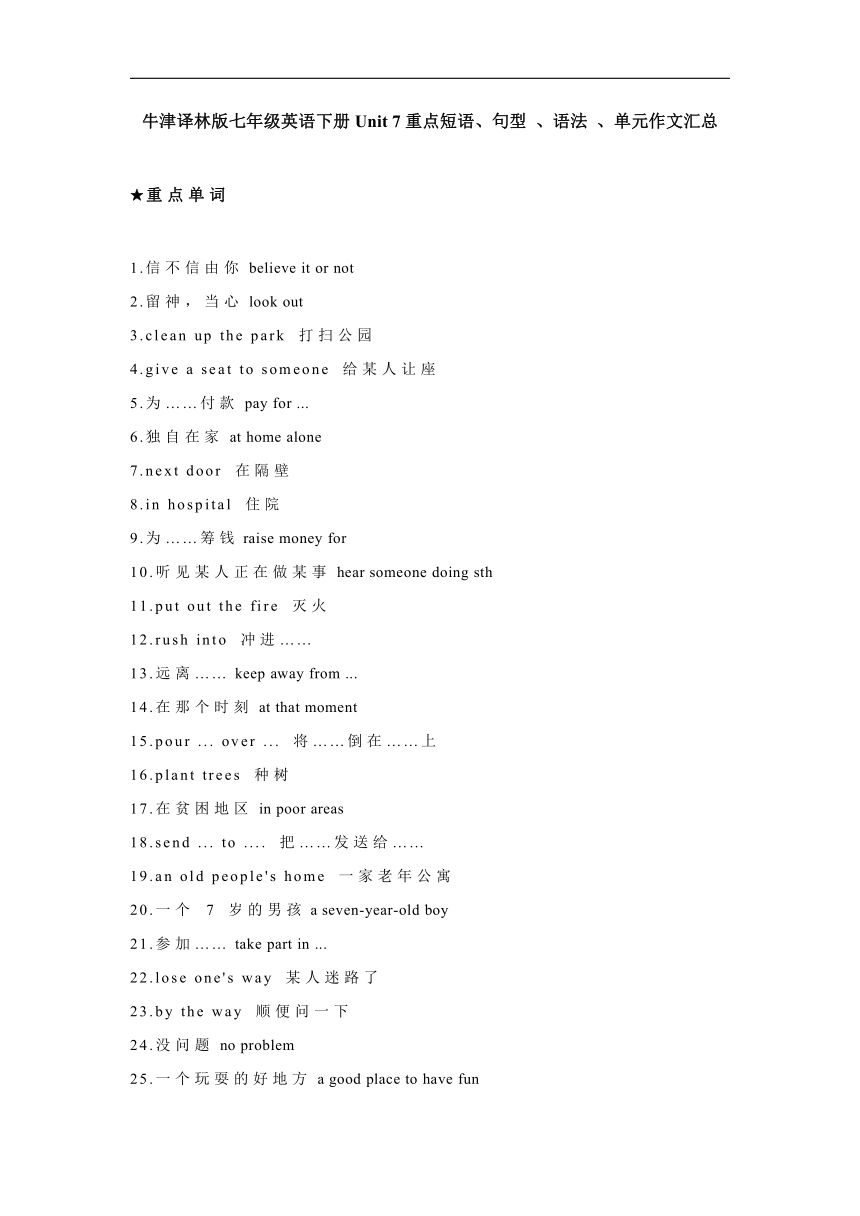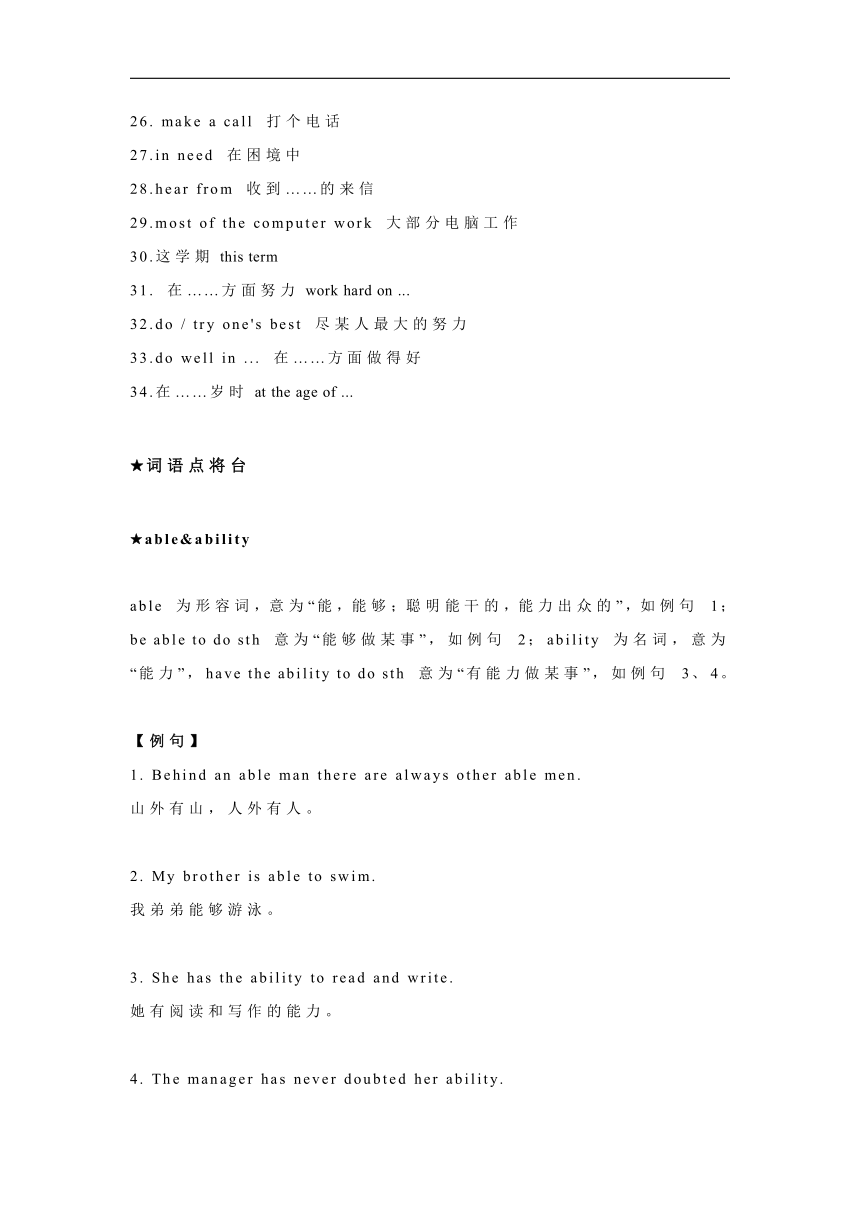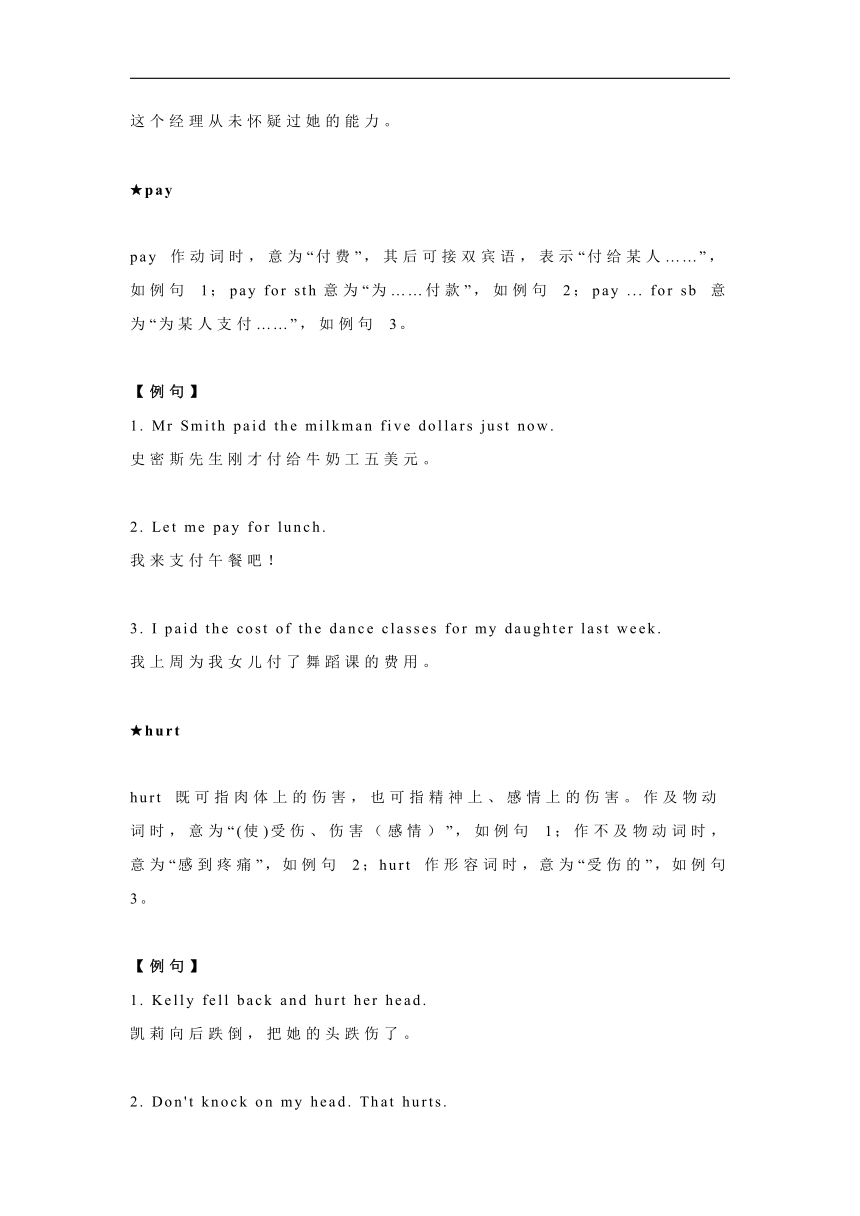Unit 7 International Charities. 重点短语、句型 、语法 、单元作文汇总
文档属性
| 名称 | Unit 7 International Charities. 重点短语、句型 、语法 、单元作文汇总 |  | |
| 格式 | doc | ||
| 文件大小 | 78.5KB | ||
| 资源类型 | 试卷 | ||
| 版本资源 | 牛津译林版 | ||
| 科目 | 英语 | ||
| 更新时间 | 2022-05-24 21:15:18 | ||
图片预览



文档简介
牛津译林版七年级英语下册Unit 7重点短语、句型 、语法 、单元作文汇总
★重点单词
1.信不信由你 believe it or not
2.留神,当心 look out
3.clean up the park 打扫公园
4.give a seat to someone 给某人让座
5.为……付款 pay for ...
6.独自在家 at home alone
7.next door 在隔壁
8.in hospital 住院
9.为……筹钱 raise money for
10.听见某人正在做某事 hear someone doing sth
11.put out the fire 灭火
12.rush into 冲进……
13.远离…… keep away from ...
14.在那个时刻 at that moment
15.pour ... over ... 将……倒在……上
16.plant trees 种树
17.在贫困地区 in poor areas
18.send ... to .... 把……发送给……
19.an old people's home 一家老年公寓
20.一个 7 岁的男孩 a seven-year-old boy
21.参加…… take part in ...
22.lose one's way 某人迷路了
23.by the way 顺便问一下
24.没问题 no problem
25.一个玩耍的好地方 a good place to have fun
26. make a call 打个电话
27.in need 在困境中
28.hear from 收到……的来信
29.most of the computer work 大部分电脑工作
30.这学期 this term
31. 在……方面努力 work hard on ...
32.do / try one's best 尽某人最大的努力
33.do well in ... 在……方面做得好
34.在……岁时 at the age of ...
★词语点将台
★able&ability
able 为形容词,意为“能,能够;聪明能干的,能力出众的”,如例句 1;be able to do sth 意为“能够做某事”,如例句 2;ability 为名词,意为“能力”,have the ability to do sth 意为“有能力做某事”,如例句 3、4。
【例句】
1. Behind an able man there are always other able men.
山外有山,人外有人。
2. My brother is able to swim.
我弟弟能够游泳。
3. She has the ability to read and write.
她有阅读和写作的能力。
4. The manager has never doubted her ability.
这个经理从未怀疑过她的能力。
★pay
pay 作动词时,意为“付费”,其后可接双宾语,表示“付给某人……”,如例句 1;pay for sth意为“为……付款”,如例句 2;pay ... for sb 意为“为某人支付……”,如例句 3。
【例句】
1. Mr Smith paid the milkman five dollars just now.
史密斯先生刚才付给牛奶工五美元。
2. Let me pay for lunch.
我来支付午餐吧!
3. I paid the cost of the dance classes for my daughter last week.
我上周为我女儿付了舞蹈课的费用。
★hurt
hurt 既可指肉体上的伤害,也可指精神上、感情上的伤害。作及物动词时,意为“(使)受伤、伤害(感情)”,如例句 1;作不及物动词时,意为“感到疼痛”,如例句 2;hurt 作形容词时,意为“受伤的”,如例句 3。
【例句】
1. Kelly fell back and hurt her head.
凯莉向后跌倒,把她的头跌伤了。
2. Don't knock on my head. That hurts.
不要敲我的头,那很疼。
3. The swallow was hurt and couldn’t fly any more.
这只燕子受伤了,再也不能飞了。
★语法点击
情态动词 can / could / may
can, could 和 may 三者都是情态动词,在句中均不能单独作谓语,其后必须接动词原形,与实义动词一起构成句子的谓语。三者都可表示“请求”与“许可”的含义。但
是在表示“请求”时,could 的语气要比 can和 may 委婉。
【例句】
Can we go and play football now
我们现在能去踢足球吗?
Could you lend me some money
你能借我点钱吗?
May I borrow your new bicycle
我可以借一下你的新自行车吗?
※ can 和 could 还可以表示有干某事的“能力”。can 表示现在的能力,could 表示过去的能力,而 may 没有这层意思。
【例句】
Can you ride a bike
你会骑自行车吗?
I could run very fast when I was a little girl.
当我是小女孩的时候,我可以跑得非常快。
What 和 How 引导的感叹句
在英语中,当我们想表示赞美、惊叹、喜悦、悲伤等强烈的感情时,我们使用感叹句。感叹句通常由 what 或 how 引导。what和 how 引导的感叹句一般情况下还可以相互转换。
※ What 引导的感叹句:What + (a / an) +adj. + 名词 + (主语 + 谓语)!
※ How 引导的感叹句:How + adj. / adv. +(主语 + 谓语)!
【例句】
What a difficult Maths problem it is!
= How difficult the Maths problem is
多难的一道数学题啊!
What beautiful flowers they are!
= How beautiful the flowers are!
这些花是多么美丽呀!
What fine weather it is!
= How fine theweather is!
多么晴朗的天气呀!
★写作一招鲜
Step 1 写作任务
假设你是 Tom,你们学校的英语俱乐部要招一名英语报作者。你认为你的好友王华是最佳人选。请你写一篇 70 词左右的推荐信,向俱乐部推荐王华。
Step 2 抛砖引玉
参考词汇:recommend 推荐,writer 作者,passage 文章,competition 竞赛
参考短语:be good at,keep a diary,win prizes, do well in,look forward to,hear from
Step 3 思路点拨
Step 4 范文展示
Dear Sir / Madam,
I would like to recommend Wang Hua for the English Newspaper's writer. She is a clever girl. She is very good at English writing and she likes to write. She keeps a diary in English every day. She won several prizes in English competitions. The students all like to read her passages.
Wang Hua always wants to join the English Club. She is kind and friendly. She often helps her classmates with their English. I think Wang Hua can do well in the English Newspaper. I am looking forward to hearing from you.
Yours faithfully,
Tom
★重点单词
1.信不信由你 believe it or not
2.留神,当心 look out
3.clean up the park 打扫公园
4.give a seat to someone 给某人让座
5.为……付款 pay for ...
6.独自在家 at home alone
7.next door 在隔壁
8.in hospital 住院
9.为……筹钱 raise money for
10.听见某人正在做某事 hear someone doing sth
11.put out the fire 灭火
12.rush into 冲进……
13.远离…… keep away from ...
14.在那个时刻 at that moment
15.pour ... over ... 将……倒在……上
16.plant trees 种树
17.在贫困地区 in poor areas
18.send ... to .... 把……发送给……
19.an old people's home 一家老年公寓
20.一个 7 岁的男孩 a seven-year-old boy
21.参加…… take part in ...
22.lose one's way 某人迷路了
23.by the way 顺便问一下
24.没问题 no problem
25.一个玩耍的好地方 a good place to have fun
26. make a call 打个电话
27.in need 在困境中
28.hear from 收到……的来信
29.most of the computer work 大部分电脑工作
30.这学期 this term
31. 在……方面努力 work hard on ...
32.do / try one's best 尽某人最大的努力
33.do well in ... 在……方面做得好
34.在……岁时 at the age of ...
★词语点将台
★able&ability
able 为形容词,意为“能,能够;聪明能干的,能力出众的”,如例句 1;be able to do sth 意为“能够做某事”,如例句 2;ability 为名词,意为“能力”,have the ability to do sth 意为“有能力做某事”,如例句 3、4。
【例句】
1. Behind an able man there are always other able men.
山外有山,人外有人。
2. My brother is able to swim.
我弟弟能够游泳。
3. She has the ability to read and write.
她有阅读和写作的能力。
4. The manager has never doubted her ability.
这个经理从未怀疑过她的能力。
★pay
pay 作动词时,意为“付费”,其后可接双宾语,表示“付给某人……”,如例句 1;pay for sth意为“为……付款”,如例句 2;pay ... for sb 意为“为某人支付……”,如例句 3。
【例句】
1. Mr Smith paid the milkman five dollars just now.
史密斯先生刚才付给牛奶工五美元。
2. Let me pay for lunch.
我来支付午餐吧!
3. I paid the cost of the dance classes for my daughter last week.
我上周为我女儿付了舞蹈课的费用。
★hurt
hurt 既可指肉体上的伤害,也可指精神上、感情上的伤害。作及物动词时,意为“(使)受伤、伤害(感情)”,如例句 1;作不及物动词时,意为“感到疼痛”,如例句 2;hurt 作形容词时,意为“受伤的”,如例句 3。
【例句】
1. Kelly fell back and hurt her head.
凯莉向后跌倒,把她的头跌伤了。
2. Don't knock on my head. That hurts.
不要敲我的头,那很疼。
3. The swallow was hurt and couldn’t fly any more.
这只燕子受伤了,再也不能飞了。
★语法点击
情态动词 can / could / may
can, could 和 may 三者都是情态动词,在句中均不能单独作谓语,其后必须接动词原形,与实义动词一起构成句子的谓语。三者都可表示“请求”与“许可”的含义。但
是在表示“请求”时,could 的语气要比 can和 may 委婉。
【例句】
Can we go and play football now
我们现在能去踢足球吗?
Could you lend me some money
你能借我点钱吗?
May I borrow your new bicycle
我可以借一下你的新自行车吗?
※ can 和 could 还可以表示有干某事的“能力”。can 表示现在的能力,could 表示过去的能力,而 may 没有这层意思。
【例句】
Can you ride a bike
你会骑自行车吗?
I could run very fast when I was a little girl.
当我是小女孩的时候,我可以跑得非常快。
What 和 How 引导的感叹句
在英语中,当我们想表示赞美、惊叹、喜悦、悲伤等强烈的感情时,我们使用感叹句。感叹句通常由 what 或 how 引导。what和 how 引导的感叹句一般情况下还可以相互转换。
※ What 引导的感叹句:What + (a / an) +adj. + 名词 + (主语 + 谓语)!
※ How 引导的感叹句:How + adj. / adv. +(主语 + 谓语)!
【例句】
What a difficult Maths problem it is!
= How difficult the Maths problem is
多难的一道数学题啊!
What beautiful flowers they are!
= How beautiful the flowers are!
这些花是多么美丽呀!
What fine weather it is!
= How fine theweather is!
多么晴朗的天气呀!
★写作一招鲜
Step 1 写作任务
假设你是 Tom,你们学校的英语俱乐部要招一名英语报作者。你认为你的好友王华是最佳人选。请你写一篇 70 词左右的推荐信,向俱乐部推荐王华。
Step 2 抛砖引玉
参考词汇:recommend 推荐,writer 作者,passage 文章,competition 竞赛
参考短语:be good at,keep a diary,win prizes, do well in,look forward to,hear from
Step 3 思路点拨
Step 4 范文展示
Dear Sir / Madam,
I would like to recommend Wang Hua for the English Newspaper's writer. She is a clever girl. She is very good at English writing and she likes to write. She keeps a diary in English every day. She won several prizes in English competitions. The students all like to read her passages.
Wang Hua always wants to join the English Club. She is kind and friendly. She often helps her classmates with their English. I think Wang Hua can do well in the English Newspaper. I am looking forward to hearing from you.
Yours faithfully,
Tom
